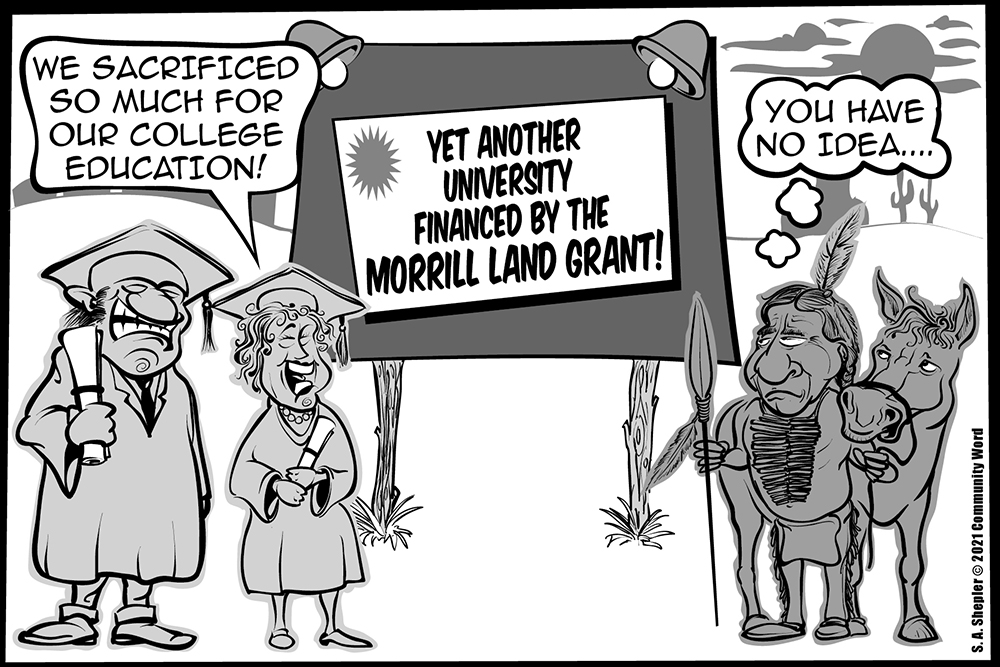
A recent report in High County News concluding a two-year investigation revealed “a dark open secret: One of the largest transfers of land and capital in the country’s history had masqueraded as a donation for university endowments.”
The report found 11 million acres of land had been expropriated from about 250 Indigenous First Nation tribes.
The University of Illinois received endowments from stolen Indigenous lands from these Native Nations: Peoria, Kaskaskia, Piankashaw, Wea, Miami, Mascoutin, Odawa, Sauk, Mesquaki, Kickapoo, Potawatomi, Ojibwe, and Chickasaw.
The land was stolen by violence and trickery.
This transfer of stolen land was formalized in 1862 when President Abraham Lincoln signed the Morrill Land Grant Act that distributed the land and its proceeds to fledgling colleges across the country.
The first school to sign up under the Morrill Act for a share of stolen land was Iowa State University.
Cornell University in Ithaca, N.Y., is the largest beneficiary of stolen Indigenous lands. After adjusting for inflation, the school raised over $92 million through this land grab.
This is not ancient history that has little or no bearing on current times. This is a moral and ethical precipice. Recognizing past injustices that continue to this day inflicted on America’s Indigenous people and Black people is the foundation for correcting and rebuilding democracy.
Both Cornell and University of Illinois have departments for American Indian studies. University of Illinois is currently expanding its department and is hiring additional faculty.
The school’s web page states: These lands are the traditional territory of these Native Nations prior to their forced removal; these lands continue to carry the stories of these Nations and their struggles for survival and identity. As a land-grant institution, the University of Illinois has a particular responsibility to acknowledge the peoples of these lands and the histories of dispossession that allowed for the growth of this institution for the past 150 years. We are also obligated to reflect on and actively address these histories and the university’s role in shaping them. This acknowledgement and the centering of Native peoples is a start as we move forward for the next 150 years.
The High Country News states that Cornell history professor Jon Parmenter calculated that 420,000 acres of mineral rights in the Central and Southwest regions of the United States are still retained by Cornell. Some of that acreage was in stolen land obtained through the Morrill Land Grant Act.
A list of student demands was put forward at Cornell including: establishing the American Indian and Indigenous Studies Program as a university department; actively recruiting Indigenous faculty and students; waiving tuition for Indigenous students and acknowledging the land of the Cayuga Nation before every campus event.
History confirms with unwavering consistency that colonialism fails.
“There would be no higher education as we know it in the United States without the original and ongoing colonization of Indigenous peoples and lands, just like there would be no United States,” Sharon Stein, assistant professor at the University of British Columbia, told High Country News. “There is no moment or time or place or institution that is not deeply entangled with the violence of colonialism.”
The relevance of injustices committed more than 150 years ago can be understood today not just through a lens of morality and ethics but also biology. We now have science-based understanding that the stress of discrimination is inherited as clearly as brown eyes or blond hair.
To redress an injustice requires study and understanding. Naoto Kan, a former prime minister of Japan stated, “If you are unable to understand the cause of a problem, it is impossible to solve it.”
America poet laureate Maya Angelou wrote: “History, despite its wrenching pain, cannot be unlived, but if faced with courage, need not be lived again.”
California Gov. Gavin Newsom accurately labeled the establishment of America’s land grant colleges through theft, appropriation and slaughter: “It’s called genocide . . . .”

Recent Comments